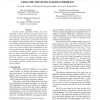Free Online Productivity Tools
i2Speak
i2Symbol
i2OCR
iTex2Img
iWeb2Print
iWeb2Shot
i2Type
iPdf2Split
iPdf2Merge
i2Bopomofo
i2Arabic
i2Style
i2Image
i2PDF
iLatex2Rtf
Sci2ools
IPPS
1998
IEEE
1998
IEEE
A Comparative Study of Five Parallel Genetic Algorithms Using the Traveling Salesman Problem
Parallel genetic algorithms (PGAs) have been developed to reduce the large execution times that are associated with serial genetic algorithms (SGAs). They have also been used to solve larger problems and to find better solutions. In this paper, a comparative analysis of five different coarse-grained PGAs is conducted using the traveling salesman problem as the basis of this case study. To make fair comparisons, all of these PGAs are based on the same baseline SGA, implemented on the same parallel machine (IBM SP2), tested on the same set of traveling salesman problem instances, and started from the same set of initial populations. As a result of the experiments conducted in this study, a particular PGA that combines a new subtour technique with a known migration approach is identified to be the best for the traveling salesman problem among the five PGAs being compared.
Distributed And Parallel Computing | Genetic Algorithms | IPPS 1998 | Parallel Genetic Algorithms | Traveling Salesman Problem |
Related Content
| Added | 05 Aug 2010 |
| Updated | 05 Aug 2010 |
| Type | Conference |
| Year | 1998 |
| Where | IPPS |
| Authors | Lee Wang, Anthony A. Maciejewski, Howard Jay Siegel, Vwani P. Roychowdhury |
Comments (0)

